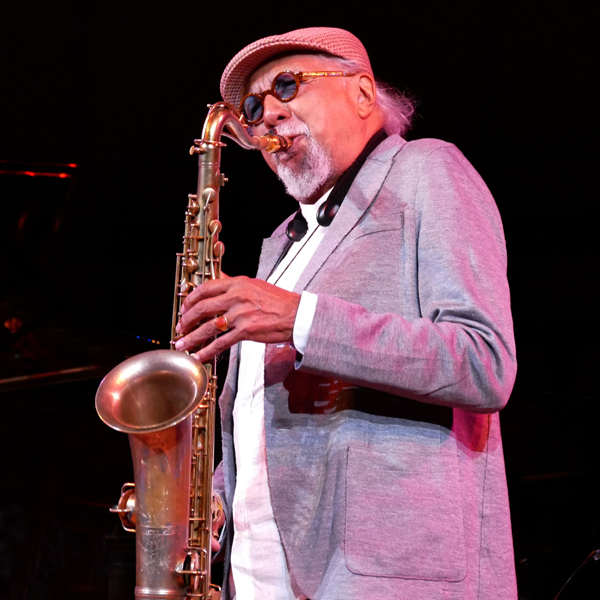June 29, 2018
When Lucinda Williams joined Charles Lloyd & The Marvels at UCLA’s Royce Hall in April 2017, the musicians beamed with unbridled joy. Same for the fans fortunate to witness, to share the depths of the artistry and exploration happening on stage. There were tears, too, as Williams reached inside herself for expressions of love, longing and loss in equal measures. But the image that remains strongest from this remarkable night is of Lloyd, radiant and enchanted, at times not even playing, just taking in the wonders of this grouping that had come together around him.
That same energy and elation buzzed through the compact sessions in a Los Angeles studio that brought us the luminescent music heard on this album, Lloyd and Williams with the singular set of talents that comprise the Marvels: Bill Frisell on guitar, Greg Leisz on steel, Reuben Rogers on bass and Eric Harland on drums — musicians who just as Lloyd and Williams have done have set their own courses, found their own ways of expression and exploration, while thriving most profoundly in sparks-filled collaborative settings.
The album opens with the instrumental “Defiant,” both an invocation, declaration and invitation to his partners to join their voices in one journey into the unknown, deep into the fullness of the human experience, the joys seen in the concerts, the darkness of doubt and despair, nothing off limits in the course of this riveting album.
“Couldn’t cry if you wanted to,” sings Williams in the next song, “Dust,” words she adapted from a poem by her celebrated father, Miller, shortly after his death on New Years’s Day, 2015. The song original first surfaced on her 2016 album “The Ghosts of Highway 20,” with Leisz and Frisell playing on that version. But here it opens into evocative representations of the contrasting/complementing sorrow and acceptance of the words, the group probing every angle of the emotions — “Even your thoughts are dust.”
That extends grippingly in what follows, the title piece, “Vanished Gardens,” a masterpiece of in-the-moment group invention, music without definition. Rogers and Harland, the foundation pieces of many Lloyd projects for nearly 20 years, roil and rumble. Frisell and Leisz work the woof and warp of a thrillingly intricate tapestry. And Lloyd is somehow at once the raging storm and its calm, still eye.
Unlock, the word that later in the album starts the song “Unsuffer Me,” a deep exposition of vulnerable, fought-for hope, describes it perfectly. Unlock my love. The state of the music, the state of these musicians, is open. Opening. Active. Seeking, expanding, exploring. Being and becoming. Williams draws power and strength from it, infusing that into her delivery, giving life to the hope, as well as the hurt, of the words. And in turn, the musicians become the words that Williams sings, extending beyond the words into the pure expression, stretching the song to nearly a dozen breathtaking minutes.
This album comes as Lloyd celebrates his 80th birthday and almost seven decades as a working musician. You can draw a line to this new music from his very first gigs at age 12 in his hometown of Memphis when he played alongside Roscoe Gordon, Bobby Blue Bland, B.B. King, Howlin’ Wolf, or Johnny Ace, and when pianist Phineas Newborn Jr. was his early music mentor and trumpeter Booker Little was his childhood best friend. Not a straight line, not by any means, but a strong one, marked by his resolute vision.
It threads through his move to Los Angeles in the mid-‘50s to study modern classical music at USC, at the same time gigging in clubs with some of the most forward-thinking figures of jazz, including Gerald Wilson, Ornette Coleman, Billy Higgins, Don Cherry, Scott LaFaro and Bobby Hutcherson, and through his role as music director of Chico Hamilton’s band (which he took over from Dolphy in 1960). It winds through the Charles Lloyd Quartet (featuring future stars Keith Jarrett, Jack DeJohnette and Ron McLure), which erased boundaries between jazz, soul and psychedelic music and in 1967 became the first jazz act to play the famed Fillmore in San Francisco, and his New Quartet of the past decade (with pianist Jason Moran joining Lloyd, Rogers and Harland). It goes through decades of culture-crossing collaborations, from a partnership with Nigerian percussionist Babatunde Olatunji in the ‘60s through more recent landmarks with Indian tabla master Zakir Hussain (the 2006 album Sangam) and Greek classical singer Maria Farantouri (2011’s Athens Concert). It’s seen him sought after to play with the Doors and the Beach Boys, with Dave Mathews and as part of the Atomic Bomb Band’s 2017 tribute album to the music of Nigerian funkster William Onyeabor. And it’s brought him honors through the decades, from Downbeat’s jazz musician of the year in 1967 to the NEA Jazz Master award in 2015 to induction into the Memphis Music Hall of Fame in 2016.
All of that figures into Vanished Gardens, even the country strains of the Marvels, reaching back to his teen years when the swinging Snearly Ranch Boys often played on bills with the groups Lloyd was in, and he became close friends with the group’s pedal steel wiz Al Vescovo. This was all in the Marvels mix, first heard on the 2016 album I Long to See You. Shortly after that release, Lloyd guested with Williams and her band (featuring Leisz and Frisell) in a Royce Hall show, a brilliant partnering, flowering fully in the Royce show a year later. Lloyd and Williams bonded easily over their southern roots. She was born in Lake Charles, Louisiana and raised in various locales of the region, moving around with her father as he established his renown as a poet and educator.
Williams, too, long ago transcended the styles with which she had been associated, while remaining grounded in and a student of traditions that have shaped not just generations of American music, but American literature — and indeed, the American character. Frisell, too, has through his acclaimed career stood as a singularly mercurial guitarist with a taste for adventure belied by a gentle spirit. Leisz has partnered with both Williams and Frisell regularly over the last two decades, developing empathic approaches that both support and enhance them, oft-understated in his approach, but always dazzling. And Rogers and Harland, who have played with Lloyd in many different settings, also bring equal measures of artistry and intuition to this music.
The collective inspiration and provocation, in the most positive sense of that word, courses through every song here, every note. No two pieces here are shaped the same, nor do any of them hold to any predictable shape. The country air breathed on I Long to See You breezes through “Ballad of The Sad Young Men,” embodied in Leisz’s pedal steel. New colors emerge from Williams’ romantic road-trip “Ventura.”
And listen how Lloyd’s solemn sax intro seeds the fervent determination of Williams’ new, gospel-informed, “We Have Come Too Far to Turn Around,” or how his playful flute skips in tandem with Frisell’s guitar through “Blues for Langston and LaRue,” or the muted conversation the two of them have (Lloyd back on sax) on Thelonious Monk’s “Monk’s Mood.” That, in turn, leads to Jimi Hendrix’s “Angel,” with Williams’ full-hearted interpretation closing the album on a note of benediction. If “Defiant” starts Vanished Gardens with a call to action, “Angel” ends it with a perfect prayer for peace.
–Steve Hochman







